#convert to epub
Explore tagged Tumblr posts
Text

We are so excited to release volume two of press, our original anthology: change & transformation. This volume features 99 pages of original short fiction in various genres, written by members of our community!
Download and read for free
#press anthology#I'll make the epub version soon but it takes converting#and I'm on deadline for work so I have to rest my arm#original fiction#short fiction
49 notes
·
View notes
Text
IM SCREAMING SOMEONE HAS A WHOLE ASS COPY OF THE OG FEARLESSLY RED THAT I LOST IN THE GREAT COMPUTER CRASH OF 2021!!!!!!! I THOUGHT IT WAS LOST FOR ALL TIME SHUT UP 😭😭😭😭😭
48 notes
·
View notes
Text
I picked up a Kobo Aura 2e for like $30 off eBay and I'm really enjoying it! I haven't had an e-reader in years, I'd forgotten how nice e-ink screens are to look at! I do wish more of my library was in epub or HTML though 😞
#Calibre can convert to epub#but it seems finnicky at best and I haven't found a good way to do it#e-reader#e-ink#kobo#reading
11 notes
·
View notes
Text
btw if you ever can't find an epub/pdf/downloadable danmei english fan translation, my advice is to check libgen first (and annas archive if that doesnt work) but if you STILL cant find it:
dm me and if i have the epub in my personal danmei gdrive folder i can send you a link (this also applies to my typeset pdfs of misvil and devil venerable and any danmei i typeset in the future, but the price is that if you find an error in those you have to tell me about it). or if it's in my ficbinding git repo i can send it to you but it may be in a weird format
if it's a non-downloadable google doc you can usually still download it as html if you disable js (on firefox you can use browser extensions like noscript or umatrix for this but im not sure what's available on chrome), change the end of the link from /edit to /mobilebasic, and refresh the doc (then use your browser to save as html). or if that doesnt work try this script. once you have html you can use pandoc to convert it to whatever format you like, including plaintext (although i've had issues with pandoc unicode handling so chinese characters may get mangled).
fan translators often post their work on like wordpress websites or whatever with more or less static html; you can use either your browser or the command-line tool curl to save individual chapters as html or (if the url has a friendly format) a simple bash+curl one-liner (e.g. for i in {1..30}; do curl -L https://foobartranslates.wordpress.com/workname-chapter-$i -o workname_$i.html; done) to bulk download (and then convert from html if you like, as above)
some translation websites (e.g. chrysanthemum garden) are somewhat more complicated and use js to load in the chapter text, so the browser save button will work (if you have js turned on) but curl won't. if you want to write a bulk download script you'll probably need to use webdriver. i wrote a chrysanthemum-garden-specific download script a while back which i can send you over DMs (if the work is password locked you'll need to join the discord for the password, which updates weekly) or, if that's too technically intimidating, i can run the script myself and send you the output
remember: anything on the internet can vanish at any time; downloading things for your personal archive is always morally right 👍
#i gotta write a script for converting a folder full of individual chapters as html files to epub.#the trashcan speaks#oh btw for cdramas and donghua they may straight up be on youtube (in which case use yt-dlp)#but if that doesnt work the sketchier streaming sites like dramacool seem to usually have download buttons#(make sure you have ublock origin if you are venturing into that realm)
32 notes
·
View notes
Text
if you'd like to read working girls by our girls, here's the pdf link because i love yall 💕
#i paid for it so yall dont have to 🫶🏽 merry belated christmas#google books dont play about their shit lol had to download in acsm then convert to epub then to pdf#t+m#k+z#workin' girls pdf
60 notes
·
View notes
Text
good news: project gutenburg has a very quick and easy way to save ebooks directly to my kindle, so i will have plenty to read on the plane tomorrow!
bad news: i have downloaded about 70 ebooks, plus the miscellaneous pdfs i had already put on there including multiple oft-recommended fanfics of 50k+ words each, and i am... probably going to be overwhelmed by choice and start and stop multiple books
#it was literally easier to download the ebook directly to my kindle than to download the pdfs#like there was just epub for most of them and i don't seem to be able to open those so i'd have had to download html and then convert it#anyway i have a 24 hour flight#well broken up but like 10+ hours in each flight#then flights once we're in australia#so i mean#no better time i guess#and at least now i have these i can just#read le morte d'arthur whenever i want if i remember my kindle#esme.txt#look i'm a hoarder especially with digital books and pdfs
4 notes
·
View notes
Text
if i were a more insane and less feverish woman i would start tracking the time to shirtlessness and time to injury in every eastwood movie. tragically we seem to be in a periodic drought where very little is available on tubi/freevee/kanopy/plex et al
#i still want to do the marlowe dialogue words to injury#but that’s proving weird wrt converting epubs into searchable pdfs
11 notes
·
View notes
Text
shout out to the random epub on my pc. what are you
#emil.rtf#im gonna convert this to pdf i dont have anything that can read epubs on my pc atm. ill figure out what this is
4 notes
·
View notes
Text
really cool how the people behind bionic reading marketed it as (from what i can tell) a free tool to help make reading with adhd easier and then as soon as it got really popular put it behind a paywall. reading the reviews for the android app it doesnt even fucking work even after you pay for it either. really cool man yeah lets have this thing be shown over and over again as a revolutionary disability aid and then force people to pay for it
#there are browser exentions and stuff which do the same thing that im using but i have not found a single thing that converts epubs like the#actual company does#awesome so cool
2 notes
·
View notes
Note
how did you get into typesetting? are there particular resources/guides you'd recommend?
i am so incredibly sorry, because the answer to your first question is almost certainly useless to you: when i was 9-12 years old i took a bunch of online math classes from the Art of Problem Solving. AoPS classes (at the time; i haven’t followed what they’re doing in years) were formatted as a chat room where the entire lecture was given in text format (vv accessible to me for both adhd and auditory processing reasons), occasionally the teacher would ask questions for you to type in a response to, and a few of the fastest correct answers would be shown to the rest of the class. especially if you used latex math typesetting to make it Look Nice (the chatroom had limited latex support).
i, a small child extremely interested in math and in Proving my Skills to the other faceless usernames in the chatroom, was super into this. with practice i eventually got really good at speed-typesetting math in latex; i also habitually wrote up all my homework in latex because my handwriting was fucking unreadable (probably because of the dyspraxia) and it was honestly simpler *and* faster than writing it on paper and scanning it.
so at that point i was just kind of in the habit of using latex whenever i wanted to make a vaguely technical document Look Nice. math camp qualifying tests. final papers for technical classes in college. personal notes and reference sheets (i’m much more likely to study things if my study materials are visually appealing, i’ve found). i discovered that with practice it *is* possible to take class notes, live, in latex, and that if you send your ~fancy~ latex notes to your friends in the class they will love you forever. plus the extra Challenge made it easier for me to pay attention in class (fuck you, adhd).
thus, when i got into ficbinding my basic approach was “download a random latex book template -> modify to my own tastes -> consult stackoverflow if anything goes wrong” and it works pretty well for me, because i’m an extremely bullheaded programmer with a decade of latex experience. would i necessarily “recommend” it to a beginner? …not really.
anyway i hear you can use ms word or another word processor to typeset fic/danmei? lots of people in the ficbinding discord seem to be pretty successful with it, and @armoredsuperheavy’s introductory ficbinding tutorial goes into some detail (all of which i fully skipped) about typesetting in word. i can’t really provide any help here, though, sorry :(
otoh if you DO want to take the plunge and go latex or go home, i’ve found that overleaf provides some pretty good basic guides to latex syntax; if you want, i can also send you some of my latex source files and talk you through what’s going on with them. you’ll almost certainly want to use the “memoir” documentclass (not “book”), so hit up ctan and download the memoir documentation while you’re at it. personally i don’t use overleaf because i am physically incapable of using any text editor without vim keybindings; you might want to start there because the live preview is super helpful for a beginner, but i have NO idea what font support is like. if you’re not using overleaf, i recommend installing xelatex on your local machine, and if you don’t already have a text editor of choice, sublime text is free* and has some nice latex extensions.
*it will occasionally nag you to buy a license but you can keep clicking “maybe later” indefinitely
(someone recommended ConTeXt to me a while back, but i can’t remember who it was. that might be a friendlier option?)
actually, would anyone be interested in me writing up a more detailed Guide to Typesetting Books in LaTeX for complete beginners/cleaning up and posting my book template? (i am bad at modeling what “a complete beginner” to latex typesetting knows, but i will beta test it on a long-suffering @combat-epistemologist.)
#the trashcan speaks#devil venerable also wants to exploit the memoir class for evil purposes#OH YEAH also if you have a html file or epub (e.g. from ao3) you can use pandoc to convert it to .tex#you can use pandoc on nearly ANYTHING actually. highly recommend pandoc#also the only reason i stopped taking aops classes was that i took ap calculus bc when i was 12 and that was the highest level they offered#so when i was 13 i had to start taking fuckin’ honors multivariable calculus or w/e cross-registered at a local college#and let me tell you. i missed the faceless online chatroom classes SO. MUCH.
16 notes
·
View notes
Text

In the chapter I'm on Wukong goes on this whole spiel about how he's only bowed to like, three people and how it's such an indignaty he has to bow to trick this demon to save his master and he's THE GREAT SUN WUKONG, and he shouldn't HAVE to!
But then he's like
Buuuuuuut. Masters's in crisis. Sooooooo. . .
(If I had made this into a full comic instead of just a picture I definitely would have cut to an image of crying Tripitaka because THAT'S the image it provokes. Just completely "My master is SO pathetic and sad I HAVE to do anything to save him I have no choice.")
#BrokenHeadacheHat Au#could technically be canon too#jttw#jttw wukong#jttw au#journey to the west#it's like chapter. . .27 I think?#I converted the pdf I had to epub and it messed up the formatting a bit#so i have to go back to check the chapter number#and I don't wanna lose my place#it was chapter 34
6 notes
·
View notes
Text
absolutely just ravaged the internet just so i can pirate a book
#went through literally every possible digital library forum shady link expeired files evertyhing#eventually found someone post an epub link and converted it to a pdf#women in stem !!
2 notes
·
View notes
Text
have you read body after body. will you read body after body. when will you read body after body.
#go to itch dot io and grab the free (free!) pdf of body after body and read it#it converted quite nicely to epub for kindle reading through whatever random site appeared when i searched pdf to epub#its so good...... dystopic transexual transhuman body horror..... mwah!
4 notes
·
View notes
Text
Trying to recover from being scared to death by playing around with my e-reader. I hate how much this works even if it's helping me survive
#i wish i had known before that it was possible to convert epubs to kepubs#literally my only slight displeasure is solved this way#also calibre is the best app every created in the history of humanity there's no competition#no other ever helpend me this much it's so fucking good
3 notes
·
View notes
Text
I have finally figured out how to convert PDF to be readable on my oldass Kindle!!! :D
#a win for the now I own super huge books as light readable epubs on a device other than my PC people#Also my Kindle not being able to support ePubs is wild hahahaha#I have to convert it every time before adding it to the device
2 notes
·
View notes
Text
Here are the pdf versions of solidarity Verso Books (for ease of accessibility):
Ten Myths About Israel by Ilan Pappe.
In this groundbreaking book, published on the fiftieth anniversary of the Occupation, the outspoken and radical Israeli historian Ilan Pappe examines the most contested ideas concerning the origins and identity of the contemporary state of Israel.
The “ten myths” that Pappe explores—repeated endlessly in the media, enforced by the military, accepted without question by the world’s governments—reinforce the regional status quo. He explores the claim that Palestine was an empty land at the time of the Balfour Declaration, as well as the formation of Zionism and its role in the early decades of nation building. He asks whether the Palestinians voluntarily left their homeland in 1948, and whether June 1967 was a war of “no choice.” Turning to the myths surrounding the failures of the Camp David Accords and the official reasons for the attacks on Gaza, Pappe explains why the two-state solution is no longer viable.
The Palestine Laboratory by Antony Loewenstein.
Israel's military industrial complex uses the occupied, Palestinian territories as a testing ground for weaponry and surveillance technology that they then export around the world to despots and democracies. For more than 50 years, occupation of the West Bank and Gaza has given the Israeli state invaluable experience in controlling an "enemy" population, the Palestinians. It's here that they have perfected the architecture of control.
Best-selling journalist Antony Loewenstein, author of Disaster Capitalism, uncovers this largely hidden world in a global investigation with secret documents, revealing interviews and on-the-ground reporting. This book shows in-depth, for the first time, how Palestine has become the perfect laboratory for the Israeli military-techno complex: surveillance, home demolitions, indefinite incarceration and brutality to the hi-tech tools that drive the 'Start-up Nation'. From the Pegasus software that hacked Jeff Bezos' and Jamal Khashoggi's phones, the weapons sold to the Myanmar army that has murdered thousands of Rohingyas and drones used by the European Union to monitor refugees in the Mediterranean who are left to drown. Israel has become a global leader in spying technology and defence hardware that fuels the globe's most brutal conflicts. As ethno-nationalism grows in the 21st century, Israel has built the ultimate model.
Palestine Speaks Edited by Mateo Hoke and Cate Malek.
For more than six decades, Israel and Palestine have been the center of one of the world’s most widely reported yet least understood human rights crises. In Palestine Speaks men and women from the West Bank and Gaza describe in their own words how their lives have been shaped by the conflict. This includes eyewitness accounts of the most recent attacks on Gaza in 2014.
The collection includes Ebtihaj, whose son, born during the first intifada, was killed by Israeli soldiers during a night raid almost twenty years later. Nader, a professional marathon runner from the Gaza Strip who is determined to pursue his dream of competing in international races despite countless challenges, including severe travel restrictions and a lack of resources to help him train.
Blaming the Victims, (mention after summary)
Since the 1948 war which drove them from their heartland, the Palestinian people have consistently been denied the most basic democratic rights. Blaming the Victims shows how the historical fate of the Palestinians has been justified by spurious academic attempts to dismiss their claim to a home within the boundaries of historical Palestine and even to deny their very existence.
Beginning with a thorough exposé of the fraudulent assertions of Joan Peters concerning the indigenous inhabitants of Palestine prior to 1948, the book then turns to similar instances in Middle East research where the truth about the Palestinians has been systematically suppressed: from the bogus—though still widely believed—explanations of why so many Palestinians fled their homes in 1948, to today’s distorted propaganda about PLO terrorism. The volume also includes sharp critiques of the wide consensus in the USA which supports Israel and its territorial ambitions while maintaining total silence about the competing reality of the Palestinians.
(Contributions by Ibrahim Abu-Lughod, Janet L. Abu-Lughod, G.W. Bowersock, Noam Chomsky, Norman G. Finkelstein, Muhammad Hallaj, Rashid Khalidi, Peretz Kidron and Elia Zureik
Edited by Christopher Hitchens and Edward W. Said)
The Punishment of Gaza by Gideon Levy.
Israel’s 2009 invasion of Gaza was an act of aggression that killed over a thousand Palestinians and devastated the infrastructure of an already impoverished enclave. The Punishment of Gaza shows how the ground was prepared for the assault and documents its continuing effects.
From 2005—the year of Gaza’s “liberation”—through to 2009, Levy tracks the development of Israel policy, which has abandoned the pretense of diplomacy in favor of raw military power, the ultimate aim of which is to deny Palestinians any chance of forming their own independent state. Punished by Israel and the Quartet of international powers for the democratic election of Hamas, Gaza has been transformed into the world’s largest open-air prison. From Gazan families struggling to cope with the random violence of Israel’s blockade and its “targeted” assassinations, to the machinations of legal experts and the continued connivance of the international community, every aspect of this ongoing tragedy is eloquently recorded and forensically analyzed. Levy’s powerful journalism shows how the brutality at the heart of Israel’s occupation of Palestine has found its most complete expression to date in the collective punishment of Gaza’s residents.
The Case for Sanctions Against Israel, (Mention after summary)
In July 2011, Israel passed legislation outlawing the public support of boycott activities against the state, corporations, and settlements, adding a crackdown on free speech to its continuing blockade of Gaza and the expansion of illegal settlements. Nonetheless, the campaign for boycott, divestment, and sanctions (BDS) continues to grow in strength within Israel and Palestine, as well as in Europe and the US.
This essential intervention considers all sides of the movement—including detailed comparisons with the South African experience—and contains contributions from both sides of the separation wall, along with a stellar list of international commentators.
(Contributions by Ra'anan Alexandrowicz, Merav Amir, Hind Awwad, Mustafa Barghouthi, Omar Barghouti, Dalit Baum, Joel Beinin, John Berger, Angela Davis, Nada Elia, Marc H. Ellis, Noura Erakat, Neve Gordon, Ran Greenstein, Ronald Kasrils, Jamal Khader, Naomi Klein, Paul Laverty, Mark LeVine, David Lloyd, Ken Loach, Haneen Maikey, Rebecca O'Brien, Ilan Pappe, Jonathan Pollak, Laura Pulido, Lisa Taraki, Rebecca Vilkomerson, Michael Warschawski and Slavoj Žižek
Edited by Audrea Lim)
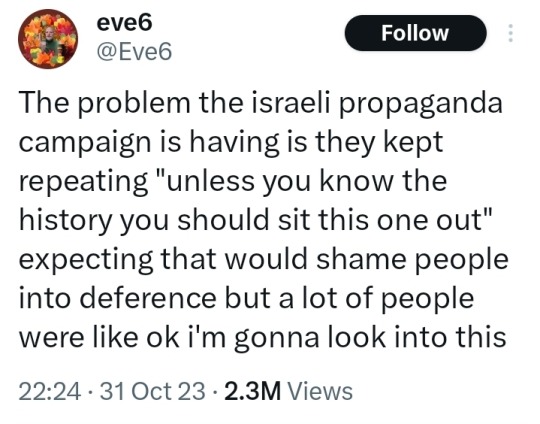
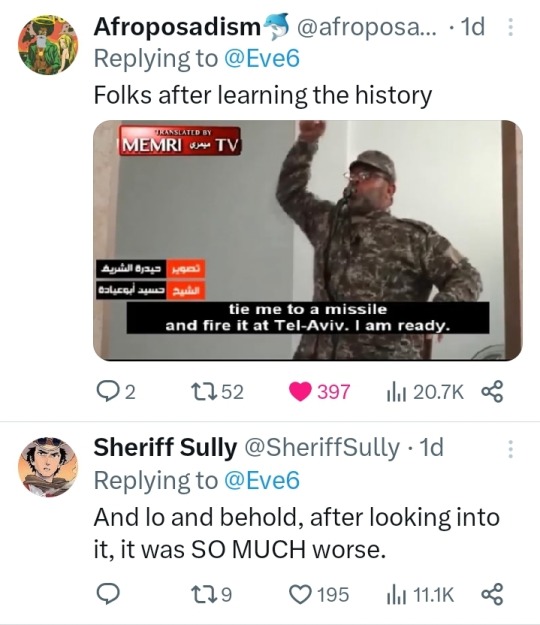


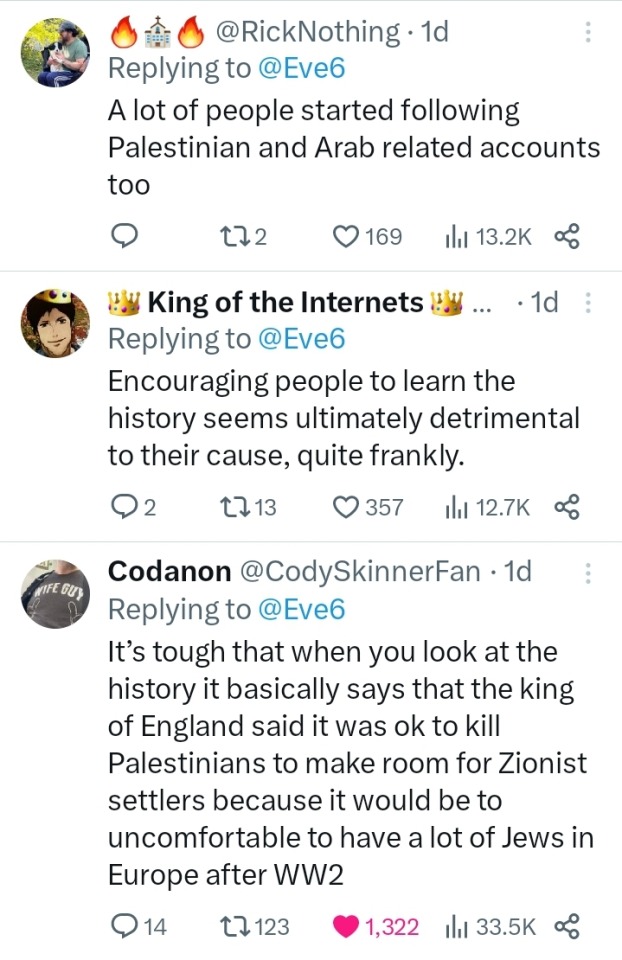
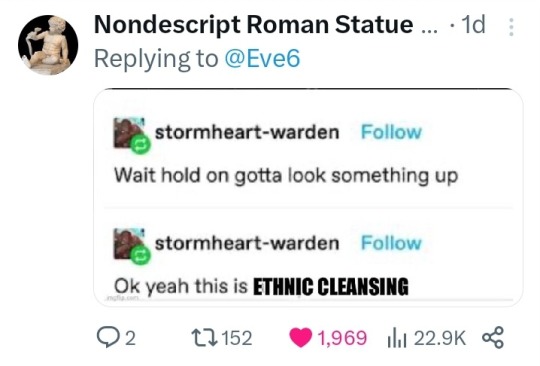
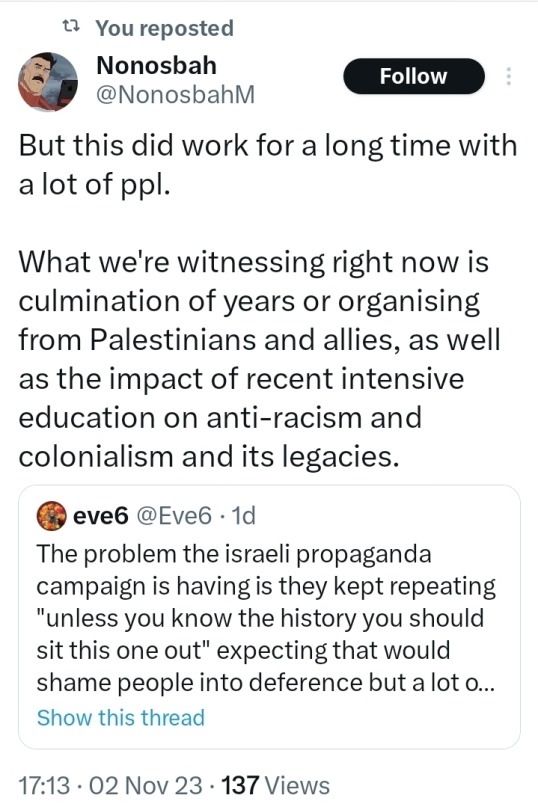
The Big Damn List Of Stuff They Said You Didn't Know
Thousands and thousands of years back in three minutes:
youtube
But closer to the issue...
Five free eBooks on the colonization and ethnic cleansing of Palestine
Pluto Books Free Palestine Reading List 30-50% off
LGBT Activist Scott Long's Google Drive of Palestine Freedom Struggle Resources
(includes some of the reading material recced below)
The Cambridge UCU and Pal Society Resources List
List of Academic and Literary Books Compiled by Dr. Kiran Grewal
Academic Books (many available in Goldsmiths library)
Rosemary Sayigh (2007) The Palestinians: From Peasants to Revolutionaries, Bloomsbury
Ilan Pappé (2002)(ed) The Israel/Palestine Question, Routledge
(2006) The Ethnic Cleansing of Palestine, OneWorld Publications
(2011) The Forgotten Palestinians: A History of the Palestinians in Israel, Yale University Press
(2015) The Idea of Israel: A History of Power and Knowledge, Verso Books
(2017) The Biggest Prison on earth: A history of the Occupied territories, OneWorld Publications
(2022) A History of Modern Palestine, Cambridge University Press
Rashid Khalidi (2020) The Hundred Years’ War on Palestine: A History of Settler Colonialism and Resistance, 1917-2017, MacMillan
Andrew Ross (2019) Stone Men: the Palestinians who Built Israel, Verso Books
Ariella Azoulay and Adi Ophir (2012) The One-State Condition: Occupation and Democracy in Israel/Palestine, Stanford University Press.
Ariella Azoulay (2011) From Palestine to Israel: A Photographic Record of Destruction and State Formation, 1947-1950, Pluto Press
Jeff Halper (2010) An Israeli in Palestine: Resisting Dispossession, Redeeming Israel, Pluto Press
(2015) War Against the People: Israel, the Palestinians and Global Pacification
(2021) Decolonizing Israel, Liberating Palestine: Zionism, Settler Colonialism, and the Case for One Democratic State, Pluto Press
Anthony Loewenstein (2023) The Palestine Laboratory: How Israel exports the Technology of Occupation around the World (CURRENTLY FREE TO DOWNLOAD ON VERSO)
Noura Erakat (2019) Justice for some: law and the question of Palestine, Stanford University Press
Neve Gordon (2008) Israel’s Occupation, University of California Press
Joseph Massad (2006) The persistence of the Palestinian question: essays on Zionism and the Palestinians, Routledge Edward Said (1979) The Question of Palestine, Random House
Memoirs, Novels & Poetry:
Voices from Gaza - Insaniyyat (The Society of Palestinian Anthropologists)
Letters From Gaza • Protean Magazine
Raja Shehadeh (2008) Palestinian Walks: forays into a Vanishing Landscape, Profile Books
Ghada Karmi (2009) In Search of Fatima: A Palestinian Story, Verso Books
Fatma Kassem (2011) Palestinian Women: Narratives, histories and gendered memory, Bloombsbury
Mourid Barghouti (2005) I saw Ramallah, Bloomsbury
Izzeldin Abuelaish (2011) I Shall Not Hate: A Gaza Doctor’s Journey on the Road to Peace and Human Dignity, Bloomsbury
Cate Malek and Mateo Hoke (eds)(2015) Palestine Speaks: Narrative of Life under Occupation, Verso Books
The Works of Mahmoud Darwish
Human Rights Reports & Documents
Information on current International Court of Justice case on ‘Legal Consequences arising from the Policies and Practices of Israel in the Occupied Palestinian Territory, including East Jerusalem’
UN Commission of Inquiry Report 2022
UN Special Rapporteur Report on Apartheid 2022
Amnesty International Report on Apartheid 2022
Human Rights Watch Report on Apartheid 2021
Report of the United Nations Fact-Finding Mission on the Gaza Conflict’ 2009 (‘The Goldstone Report’)
Advisory Opinion on the Legal Consequences of the Construction of a Wall in the Occupied Palestinian Territory, International Court of Justice, 9 July 2004
Films
Lemon Tree (2008)
Where Should The Birds Fly (2013)
Naila and the Uprising (2017)
Waltz with Bashir (2008)
Omar (2013)
Paradise Now (2005)
5 Broken Cameras (2011)
The Gatekeepers (2012)
Foxtrot (2017)
Gaza Mon Amour (2020)
The Viewing Booth (2020)
Innocence (2022) - Innocence (2022) | IDFA Archive
The Village Under the Forest (2013)
Palestine Film Institute's films on Gaza
Abby Martin - Gaza Fights For Freedom (2019) | Full Documentary | Directed by Abby Martin
Dan Cohen - Gaza Fights Back | MintPress News Original Documentary
‘The Promise’, directed by Peter Kosminsky (2010) (4 part miniseries on the creation of Israel)
Sources:
https://www.972mag.com/
https://jewishcurrents.org/
Jadaliyya ‘Gaza in Context’ Series
Jadaliyya “War on Palestine” podcast - The War on Palestine Podcast: Episode 1
Border Chronicle, Interview with Israeli anthropologist Jeff Halper
NGOs
B’Tselem
Breaking the Silence
Al Haq
Palestinian Feminist Collective
Yesh Din
DAWN
Amnesty International
Human Rights Watch
Gisha
Forensic Architecture
Instagram Accounts
gazangirl
mohammedelkurd
khaledbeydoun
motaz_azaiza
wizard_bisan1
etafrum
sara_mardini963
Twitter(X) Accounts
@PalStudies - Institute for Palestine Studies
@medicalaidpal
@middleeastmatters
@KenRoth - former executive director of Human Rights Watch
@YairWallach - Reader in Israel Studies at SOAS
@ PhilipProudfoot - researcher on development, humanitarianism and Arab states
@btselem - Israeli human rights documentation centre
@MairavZ - Senior Israel-Palestine Analyst at Crisis Group
@rohantalbot - Director of Advocacy and Campaigns at MedicalAidPal
@sarahleah1 - Executive Director of DAWN (democracy and human rights in MENA)
@alhaq_org - Palestinian human rights organisation
@FranceskAlbs - UN Special Rapporteur on the Occupied Territories
@Yesh_Din - Israeli human rights organisation
@sfardm - Michael Sfard, Israeli Human Rights Lawyer
@EphstainItay - Israeli international humanitarian lawyer
@saribashi - Program director for Human Rights Watch (Israeli living in Palestine)
@Gisha_Access - Israeli NGO
@_ZachFoster - Historian
Share widely!
(if any links are broken let me know. Or pull up the current post to check whether it's fixed.)
From River To The Sea Palestine Will Be Free 🇵🇸🇵🇸🇵🇸
83K notes
·
View notes